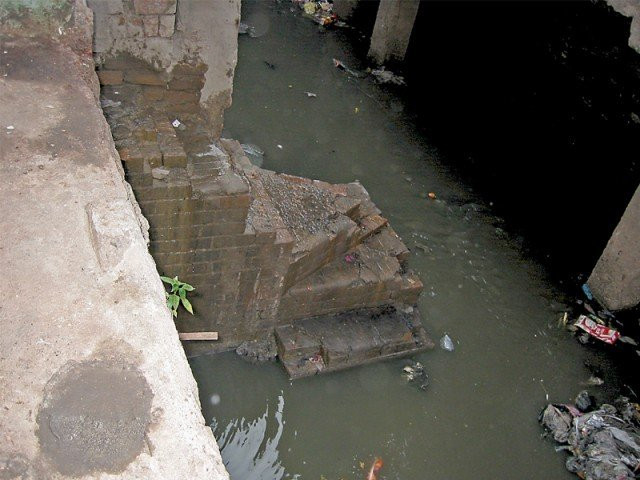Down in the gutter: City swims in filth as dumping continues
K-P Canal and Drainage Act was easy to pass, difficult to implement

K-P Canal and Drainage Act was easy to pass, difficult to implement. PHOTO: RIAZ AHMED/EXPRESS
The provincial capital’s canals are home to every conceivable type of filth. While the provincial government was quick enough to amend the K-P Canal and Drainage (Amendment) Act 2015, practical implementation could take a lifetime longer.
Increased fines and prison terms were part of the new amendments and sounded like foolproof deterrents, but nobody was at hand to impose the law.
Under the amended law, anyone throwing garbage, polythene bags in canals or land encroachers diverting sewerage lines towards the canals would be fined Rs20,000 and imprisoned for up to two years. Tonnes of solid waste material had to be removed from canals in the ongoing cleaning drives and this has proved the department is unable to implement the law and charge violators.
He said, she said
A majority of the officials of the irrigation department were not aware of the changes to the law and others maintained the legislation was useless.
Though the law was passed from the K-P Assembly three months ago, the department has yet to charge anybody who violates it. Similarly, department officials at the Civil Secretariat were not aware of the amendments and accused the law department of not sending any intimation.

Law department officials said they only deal with vetting of the bills which would then be published in official gazettes once turned into law.
Officials unaware
When asked about progress in implementing the act, Irrigation Deputy Secretary Misbahuddin and Section Officer Operations Izzat Khan said they were unaware of amendments and it was the job of field officers of the department.
A senior official of the irrigation department said the amendments were useless. “Unless you provide an alternative to people, you can’t expect them not to throw garbage in canals passing near their homes,” said the official. He admitted the government had to provide garbage points but has not yet.
“In 2014, we were conducting an operation in Bashirabad and cutting off sewerage pipelines pouring into the canal. However, local women took up sticks, wanting to attack us, and so we had to stop the operation,” the official explained the severity of the situation. He said officials took police along with them for the drive and could have arrested violators, but avoided doing so as they feared a public backlash.
The officer acknowledged solid waste thrown into the canals increased operational and maintenance costs, but they were helpless.
“The canals are from Kabul River and the river brings in silt in large quantity,” the official said. “Solid waste material stuck along the bridges and pipelines crossing the canals slow down the flow. This causes silt to sit and fill the canal,” he explained. The official said his department was answerable even to the last farmer at the end of the canal because it charges for water availability.
Talking about the irrigation department’s failure to implement the law and charge violators, he said, “Before 2002, the department had magisterial powers. However, these are now with civil judges and canal inspectors or officials have to lodge FIRs against the violators and then follow the case. Who would do this?”
Minister for Irrigation Sikandar Hayat Sherpao told The Express Tribune, “Canals are within the city and this causes problem; the department alone can’t resolve the issue.” Sherpao said the Peshawar district administration has to be taken on board and there would soon be a meeting to make implementation of the law possible.
Published in The Express Tribune, January 25th, 2016.













COMMENTS
Comments are moderated and generally will be posted if they are on-topic and not abusive.
For more information, please see our Comments FAQ